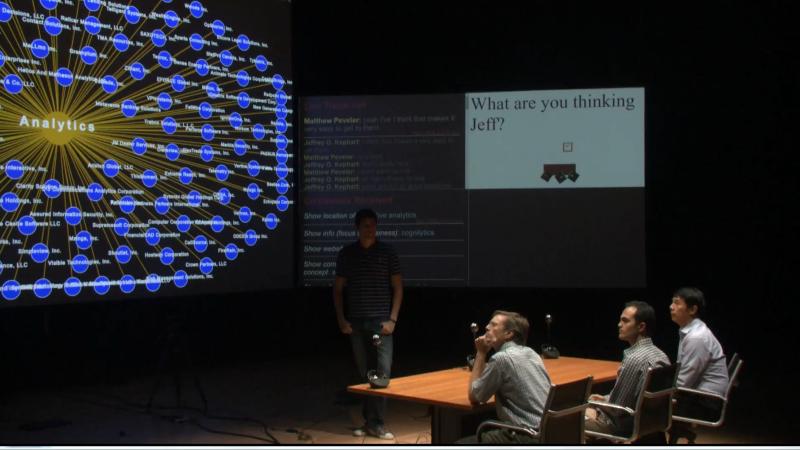Conference at Rensselaer features demonstration of cognitive and immersive “situations room”
June 8, 2017

Rensselaer Polytechnic Institute hosted the fifth annual Conference on Advances in Cognitive Systems May 12-14, featuring presentations from researchers at organizations including Naval Research Lab, MIT, Google, Georgia Tech, and IBM. On May 11, the Cognitive and Immersive Systems Laboratory (CISL) at Rensselaer hosted a related workshop on cognitive and immersive systems, including a demonstration of the “situations room” the lab is developing as part of an ongoing collaboration between Rensselaer and IBM.
“This is the first time the CISL, a collaboration between RPI and IBM, is hosting a workshop for researchers in multiple academic institutes to discuss and define the research agenda for cognitive and immersive systems. It is also the first time CISL is sponsoring the Advances in Cognitive Systems Conference where people in the top research institutes meet to discuss cognitive systems research results,” said Hui Su, director of CISL. “It’s an opportunity to demonstrate CISL research results and articulate CISL’s cross-disciplinary research agenda to our peer academic institutes.”
The annual conference brings together researchers with an interest in building computational artifacts that focus on high-level cognition and decision making, reliance on rich, structured representations, and incorporation of insights about human thinking.
The “situations room” CISL is developing is an example of an application for cognitive systems. The vision for the room is a space where humans can interact naturally with computers in collaborative situations like making business decisions, diagnosing medical issues, handling emergency response, and learning.
As an initial milestone, CISL has developed a prototype that ties together multiple technologies in a functioning space where humans can interact naturally with computers. The prototype situations room can understand and register speech, three specific gestures, the position of occupants of the room, their roles, and the spatial orientation of those occupants, triggering the correct cognitive computing agents to take action and bring data and information relevant to the discussion into the room in real-time. The functions are rudimentary, but the promise is clear.
Research presented at the conference contributes to the original, yet unmet goals of artificial intelligence: to produce computational systems that reproduce a broad range of human cognitive abilities. Topics include conceptual inference and reasoning, memory storage and retrieval, language processing, social cognition and interaction, high-level execution and control, problem solving and heuristic search, cognitive aspects of emotion and personality, metacognition and meta-level reasoning, structural learning and knowledge capture, and cognitive vision and high-level perception. A full program is available on the conference website.
CISL is enabled by the vision of The New Polytechnic, an emerging paradigm for higher education which recognizes that global challenges and opportunities are so great they cannot be adequately addressed by even the most talented person working alone. Rensselaer serves as a crossroads for collaboration — working with partners across disciplines, sectors, and geographic regions — to address complex global challenges, using the most advanced tools and technologies, many of which are developed at Rensselaer. Research at Rensselaer addresses some of the world’s most pressing technological challenges — from energy security and sustainable development to biotechnology and human health. The New Polytechnic is transformative in the global impact of research, in its innovative pedagogy, and in the lives of students at Rensselaer.
About Rensselaer Polytechnic Institute
Rensselaer Polytechnic Institute, founded in 1824, is America’s first technological research university. For nearly 200 years, Rensselaer has been defining the scientific and technological advances of our world. Rensselaer faculty and alumni represent 85 members of the National Academy of Engineering, 17 members of the National Academy of Sciences, 25 members of the American Academy of Arts and Sciences, 8 members of the National Academy of Medicine, 8 members of the National Academy of Inventors, and 5 members of the National Inventors Hall of Fame, as well as 6 National Medal of Technology winners, 5 National Medal of Science winners, and a Nobel Prize winner in Physics. With 7,000 students and nearly 100,000 living alumni, Rensselaer is addressing the global challenges facing the 21st century—to change lives, to advance society, and to change the world. To learn more, go to www.rpi.edu.